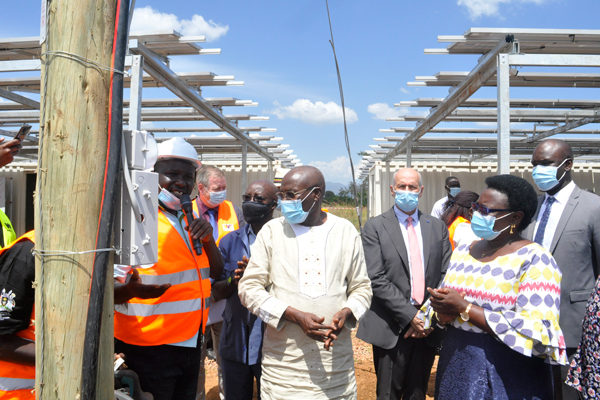New solar grid to light 3,000 homes in Lamwo

State minister for Energy Okaasai Sidronius Opolot (centre) flanked by the head of the European Union Delegation to Uganda, Mr Attilio Pacifici, during the commissioning of the solar-powered mini grid at Paloga Sub-county headquarters in Lamwo District on Tuesday. Photo/Tobbias Jolly Owiny
What you need to know:
State Minister for Energy, Mr Sidronius Okaasai Opolot, says overreliance on charcoal is jeopardising the country’s fight against climate change.
The State Minister for Energy, Mr Sidronius Okaasai Opolot, has commissioned 25 solar-powered mini grids in Lamwo District under the Promotion of Mini-Grids for Rural Electrification Project .
The event, which took place at Paloga Sub-county headquarters on Tuesday, is one of the components of the Development Initiative for Northern Uganda (DINU).
Mr Okaasai said the mini grids are part of the 40 that government tendered for development about a year ago.
He said over reliance on charcoal was jeopardising the country’s fight against climate change, adding that government was committed to prioritising clean energy.
“We should recognise the need to conserve the environment, access to electricity, facilitating access to an alternative source of cooking materials will also allow fighting forest destruction caused by charcoal production,” Mr Okaasai said.
The project will ensure supply of electricity to at least 3,000 homesteads and 100 business units across 25 villages.
The villages include Tumanum B (Agoro Sub-county), Paloga Central, Ogili TC, Pangira/Licwar Central, Potika, Ngomoromo, Kapeta, Apwoyo TC, Oboko TC, Loromibeng A, and Lelapwot West.
Others are Opoki, Pany Buk East and West, Muddu Central, Moroto East, Otaa, Ywaya, Aweno Olwi, Ayuu Alali, Logwak, Lapidiyenyi, Pawena TC, Apyetta TC.
The construction of the facility was conducted with funding from the European Union and the German Government at a tune of Shs18 billion.
The establishment aims at reducing poverty, and strengthening the foundation for sustainable and inclusive socio-economic development.
The beneficiaries shall also get solar-powered street lighting and improved water services such as pumping and purification.
Mr Dennis Onyong, the Apyeta Village chairperson, said the initiative would boost agricultural productivity and income for smallholders.
“The facility is a big boost to us, despite producing a lot in the past, we would earn little as farmers because value is not added to the products being delivered to the market and we hope to change this,” he said.
Ms Cecilia Menya, the project director at the Ministry of Energy and Mineral Development, said the electricity can be used for domestic purposes such as lighting, cooking, and commercial purposes such as milling, welding, and refrigeration.
“New off-grid and decentralised solutions like this prove that renewable energy technologies are cost-effective compared to grid extension in addressing both the energy demand of millions of underserved people across the country and combating global warming,” Ms Menya said.
Ambassadors say
The head of the European Union Delegation to Uganda, Mr Attilio Pacifici, tasked government to provide environment-friendly cooking alternatives in order to avert over dependence on charcoal.
Mr Pacifici added that this would curb degradation of the environment.
“Government needs to urgently tackle illegal charcoal burning by investing more resources into clean energy infrastructure in order to offer Ugandans a safer alternative to charcoal,” he said.
Mr Matthias Schauer, the German ambassador to Uganda, said only 19 percent of Ugandans had access to electricity.
Mr Schauer attributed this to the lack of transmission and distribution facilities.
According to Mr Okaasai, the National Development Plan III aims to have 1,500 mini grids installed in the next five years, and the current National Electrification Strategy plans about 2,700 mini-grids to be installed by 2030.




